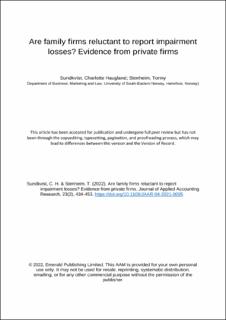| dc.contributor.author | Sundkvist, Charlotte Haugland | |
| dc.contributor.author | Stenheim, Tonny | |
| dc.date.accessioned | 2023-04-21T10:15:59Z | |
| dc.date.available | 2023-04-21T10:15:59Z | |
| dc.date.created | 2021-09-22T17:40:27Z | |
| dc.date.issued | 2021 | |
| dc.identifier.citation | Sundkvist, C. H. & Stenheim, T. (2022). Are family firms reluctant to report impairment losses? Evidence from private firms. Journal of Applied Accounting Research, 23(2), 434-453. | en_US |
| dc.identifier.issn | 0967-5426 | |
| dc.identifier.uri | https://hdl.handle.net/11250/3064221 | |
| dc.description.abstract | Purpose: This study examines the reporting of impairment losses in family and non-family private firms. The socioemotional wealth (SEW) theory suggests that the reporting practices in family firms may differ from non-family firms and may vary among family firms.
Design/methodology/approach: The research question is examined using a large-scale archival study. The authors use unique register data on family relationships for Norwegian private firms provided by the CCGR database at BI Norwegian Business School.
Findings: Drawing on the socioemotional wealth theory, the authors predict and find that private family firms are more reluctant to report impairment losses compared to private non-family firms. The results also suggest that both the likelihood to report impairment losses and the impairment amounts increase with board independence in private family firms. The authors also find some evidence suggesting that private family firms with a family CEO report lower impairment losses than private family firms without a family CEO, but this result is less robust and should be interpreted with caution.
Research limitations/implications: The true economic impairment is unobservable. The authors use proxies based on prior research to control for whether impairment losses are faithfully reported or not.
Practical implications: The results suggest a higher risk of impairment losses being managed in private family firms than in private non-family firms and that independent board members mitigate this tendency somewhat in private family firms. Awareness of this risk should have practical value for stakeholders such as non-family owners and creditors, external auditors, supervisory and monitoring bodies, and regulators.
Originality/value: This study contributes to the accounting literature by examining the reporting of a specific accrual (impairment losses) in the setting of private family firms. Prior research in this area is scarce. | en_US |
| dc.language.iso | eng | en_US |
| dc.title | Are family firms reluctant to report impairment losses? Evidence from private firms | en_US |
| dc.type | Peer reviewed | en_US |
| dc.type | Journal article | en_US |
| dc.description.version | acceptedVersion | en_US |
| dc.rights.holder | © 2022, Emerald Publishing Limited. This AAM is provided for your own personal use only. It may not be used for resale, reprinting, systematic distribution, emailing, or for any other commercial purpose without the permission of the publisher. | en_US |
| dc.source.pagenumber | 434-453 | en_US |
| dc.source.volume | 23 | en_US |
| dc.source.journal | Journal of Applied Accounting Research | en_US |
| dc.source.issue | 2 | en_US |
| dc.identifier.doi | https://doi.org/10.1108/JAAR-04-2021-0095 | |
| dc.identifier.cristin | 1937331 | |
| cristin.ispublished | true | |
| cristin.fulltext | postprint | |
| cristin.qualitycode | 1 | |
